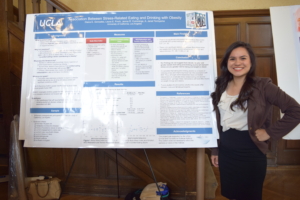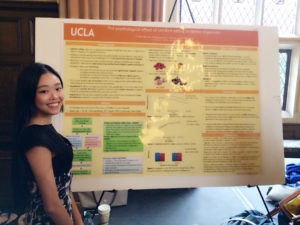DiSH lab presenting at PURC!
So proud of our two research assistants, Bernice and Diana, who did such an awesome job presenting their posters at the Psychology Undergraduate Research Conference (PURC) last Friday! Laura Finch, one of the graduate students in the DiSH lab, also did a fabulous job mentoring them both.
Diana in front of her poster
Bernice in front of her poster
Diana, Laura, and Bernice at the conference
Here is what Diana had to say about the experience:
“As a Psychology Research Opportunities Programs (PROPS) Scholar, I had the opportunity to receive guidance from wonderful graduate mentors who have guided me through the entire process of creating a research question to creating a poster for my very first conference. It has been very stressful, yet a very fun learning experience. The poster I presented at the Psychology Undergraduate Research Conference (PURC) examined the association between stress-related eating and drinking, specifically alcohol consumption, with obesity. Using the Belief in Comfort Eating Scale and Alcohol Expectancies Questionnaire from the Comfort Study, I was able to measure beliefs in eating and alcohol consumption. Although our findings were not significant, it is particularly interesting because it is possible that interventions to eradicate stress-related eating and alcohol consumption may have little impact on weight change and obesity.”
And here is what Bernice had to say:
“The study I presented at PURC focused on comfort eating, which is commonly defined as increased consumption of high-sugar high-fat or high-calorie food in response to negative emotions. Comfort eating is one of the contributing factors to obesity, so we wanted to know whether the benefit of it outweighed its risk. Therefore, we were one of the first to test if consuming people’s choice of comfort food dampened the negative emotions induced by a stressor or altered the stress appraisal.We induced the psychological responses by using the Trier social stress test, where we asked the participant to perform a speech task and a mental math task in front of two evaluators who kept neutral and nonresponsive manners. These tasks were difficult! The result showed that there was no significant difference between people in the control group who sit and rest for five minutes prior to the stressor and people in the comfort eating group who consumed their choice of healthy or unhealthy comfort food following random assignment. Therefore, our conclusion is comfort eating is not an effective coping method for stress.”
Both of their posters looked awesome! Good job girls!



